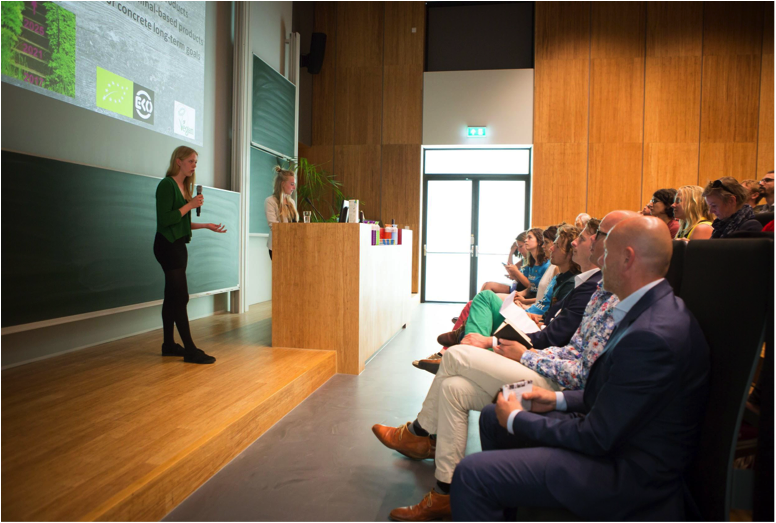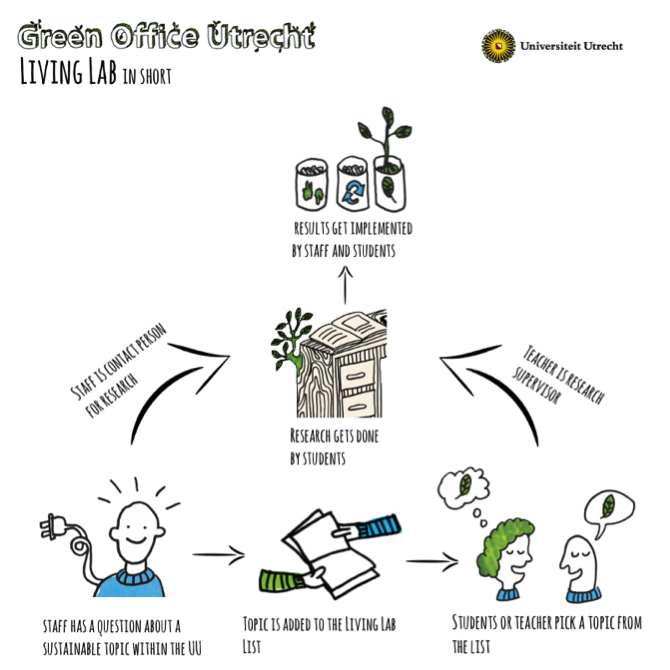Long Live Living Labs


What is the quickest way to make universities sustainable? By involving students in sustainability research! The Living Lab of the Green Office Utrecht brings together students, teachers and staff members of the university and makes sustainability research on university campus happen. Do you want to be involved too? Check out the Living Lab Symposium on the 8th of June!
Door Nick Bijlsma en Briede van Bemmelen
What is a living lab?
According to the European Network of Living Labs (2017), a living lab can be defined as a user-centred, open innovation ecosystems based on a systematic user co-creation approach integrating research and innovation processes in real life communities and settings. Or easier said: a living lab is a real-life experimenting area where research and observation is taking place.
Living Lab Green Office Utrecht
The ‘Living Lab’ programme was introduced a few years ago by the Green Office Utrecht. It uses the university campus as a living lab for sustainable development. The Living Lab research touches upon a wide variety of sustainability issues. Research questions range from ‘what is the influence of human activity on the bat population that lives on the Utrecht University Campus?’ to ‘what is the most sustainable way for Utrecht University to offer coffee on campus?’.
One of the main pillars of Green Office Utrecht is to make use of all the knowledge regarding sustainability that is concentrated at Utrecht University. From ecological to organizational problems, sustainability issues reach beyond the borders of faculties. Through the Living Lab, multidisciplinary groups of BSc- and MSc-students get the chance to work on these sustainability issues in real life. The Living Lab facilitates the merger between the curriculum and student-research on the one hand, and the transition to sustainability of Utrecht University on the other.
Living Lab List

Living Lab Program of the Green Office Utrecht
Crucial to the Living Lab is the Living Lab List. Here questions about sustainability topics are added by university staff or by the Green Office herself. Students or teachers can pick a topic for either their thesis or their course. This gives students the opportunity to engage in real-world problems within their education and research activities, while they also acquire the capacities to solve complex problems for their future careers. In this way the research is executed by students and supervised by teachers. After the research is finished, the results will be implemented by staff and students.
Examples of Living Lab Research
Last year, co-author Briede and her team won the prize for the best Living Lab research at its annual symposium. The enthusiastic group of Environmental- and Social Sciences students first worked on the definition of sustainability, to be used afterwards as a framework to define Sustainable Catering.
They worked out scenarios to provide Utrecht University with options to facilitate sustainable catering. All scenarios aimed at reducing the use of animal products, offering more local food and only organic food. The advice was to define what is actually meant by ‘sustainable’ food and catering, and then work on a long-term strategy towards it. Therefore, Utrecht University was advised to keep on working towards a more sustainable catering, even after these goals are met.
Living Lab Symposium: 8th of June 2017

Presentation of Winner Living Lab Symposium 2016
Every year the Green Office Utrecht hosts a Living Lab Symposium, where the best results of research conducted throughout the academic year is presented. Furthermore, prizes are awarded for the best research and a prominent person within the university will give a speech to all attending.
We would like to cordially invite you all to the 4th edition of the Living Lab Symposium on Thursday 8 June 2017. For more information, check the Living Lab Symposium website, or register immediately.
Interested in the Living Lab and do you want to know more? Don’t hesitate to contact the Living Lab Coordinator and Living Lab Officer of the Green Office Utrecht by email: living.lab@greenoffice.nl
